Undeterred, spinners claimed that tough decisions had created the fiscal headroom to restore the payment – despite the arithmetic suggesting otherwise. Removing the benefit may have been economically sound, if politically naïve; restoring it is undoubtedly the opposite.
Defence was always going to be a “winner”, as Donald Trump’s jaggy stick on the need to up the shekels is being felt in Whitehall, as it is in all other Nato nations. And the predictable sacred cow of the NHS was also on the positive side of the messaging as there is no sum of money big enough to be poured into this national institution, regardless of the actual cost of doing so.
As with all things Treasury, there are consequentials for Scotland – and the scale of these demands a whole new set of messages. You can guarantee that whatever colour the UK government happens to be, it will hammer home the “record settlement and the biggest of the devolved era” set of soundbites – knowing full well that an increase of a mere pound would sustain that argument. The more careful analysts take time to scrutinise the numbers against previous promises, inflation, and projected income prior to the Chancellor taking to her feet.
Read more by Calum Steele
In this case – as indeed in so many of the recent past – the SNP has legitimate cause to cry foul. Respected independent bodies like the Fraser of Allander Institute, which are equally capable of causing headaches for the SNP as they are of giving power to their arguments, set their boffins on to Rachel Reeves’s sums and found they didn’t quite add up in the way they were packaged.
The trouble the Scottish Government now faces is a direct contradiction of the one faced by Rachel Reeves: it is much more economic than presentational. It can be certain that in the areas the UK Government has decided to prioritise, it will face almost unanimous calls to match the funding for relevant departments here in Scotland. On top of that, it will face the generic “record funding” heckle from opponents demanding support for the areas ignored by the occupant of No 11 Downing Street.
With an election less than 12 months away, it may be tempting for the SNP to follow suit with the increase in funding for the NHS (defence doesn’t deliver any Barnett bonus) and hope that framing cuts elsewhere as the result of Westminster-imposed austerity carries the day.
Despite having been found to be strategically wanting in the recent Hamilton, Larkhall and Stonehouse by-election, it’s difficult to imagine the SNP has much appetite for a wholesale change of direction. If it – and indeed any of the main parties – is serious about tackling the challenges facing this country, it will need to swallow hard and be prepared to take a pound of flesh from the sacred cow all parties have hitherto revered: the NHS.
Now, I’m not suggesting for a minute that Scotland should go it alone and abandon one of our most beloved institutions – for even in the most pragmatic of worlds, even I can see that’s a stonewall vote loser. But – and bear with me here – if we look at the consequential impact of the singularly unique protection afforded to the NHS by consecutive governments (United Kingdom and devolved), we can see that the effect of doing so on the other services we need for a functioning, harmonious, and prosperous society has been catastrophic.
Everyone loves the feel-good factor of announcing more money, doctors, nurses, and midwives. Everyone loves to celebrate pay settlements when they trump those of our neighbours, and everyone throws their arms up to praise the NHS gods whenever an extra pound goes into it. And if the NHS existed in splendid isolation, I’m pretty sure I would be among the loudest voices doing so.
But it doesn’t.
The slow strangulation of local government and services on both sides of the border – particularly since the 2008–09 financial crisis – has been a direct consequence of the refusal to share austerity pain across departments. As all parts of the public sector grew in the good times, they should have equally shared the burden of cuts in the bad.
Rachel Reeves delivers her Government’s spending review to MPs last Wednesday (Image: PA) While the NHS has hardly glistened, its position is far better than those of local services like housing, education, social care, and policing. As a result, it has largely escaped structural reform and grown into a bloated, managerial-heavy behemoth that consumes all before it.
By comparison, local government has taken a scythe to essential services, causing almost irreparable harm to those who rely on them. It is almost unarguable that the dogma surrounding NHS funding has actually made us all unhealthier – as the local services we all need have declined to such an extent as to render those NHS headlines irrelevant. The increase in societal tensions has its roots firmly embedded in the scunner factor associated with that decline, and the loss of trust in both the institutions themselves and the governments who indirectly oversee them can hardly be a price worth paying.
We can have cleaner pavements, better roads, schools, child and social services – along with a police service that actually investigates crime, and a legal, court, and penal system that works – as well as money for infrastructure and investment. Or we can keep pouring money into an NHS monolith. But we can’t have both.
The question for the SNP is the same as the one for us all. When do we accept that fact and do something about it?
Calum Steele is a former General Secretary of the Scottish Police Federation, and former general secretary of the International Council of Police Representative Associations. He remains an advisor to both.
